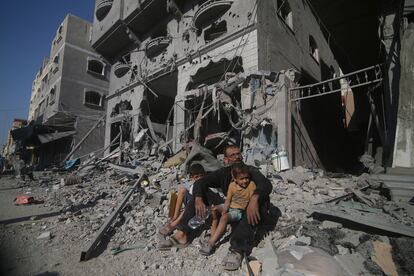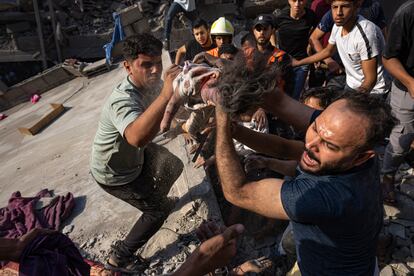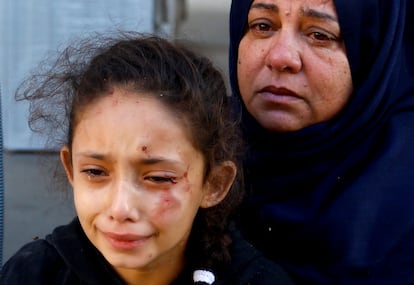Voices from a besieged Gaza: ‘There is no safe place to go’
Fear reigns among the 2.2 million residents of the Strip, which is under bombardment by Israel, and where the only power plant is no longer working and the water supply is in danger
“I cannot talk now. I will write to you at the end of the day… if I have not died.” In a series of audio messages, Hala Riziq recounts her escape from one area of Gaza to another. Israel keeps the strip of land completely surrounded and has dropped several hundred tons of bombs since the massive militia attack by Hamas that began on Saturday, causing 1,200 deaths. The audio files arrive from time to time, because there is no internet service and the data connection is spotty. On Wednesday, the lack of fuel shut down the only power plant, according to Hamas officials. This also endangers the water supply because the plant feeds the underground water extraction pumps. Israeli Defense Minister Yoav Gallant decreed a “complete siege” on Monday, with no water, food, electricity, or fuel supplies.
Riziq, 45, says that on Sunday she ran out of her home in the capital of Gaza with her husband and four children, after an airstrike on a building 50 meters away. “I was running from one place to another. The street was full of people who didn’t know where to go. I had a panic attack because I was looking at my children and I didn’t know how to protect them,” she says, while bombings are heard in the background.
She then went to one of the hotels with “security clearance.” These are buildings whose coordinates are given to Israel because they usually house workers from international organizations, NGOs, or journalists. Two hours later, Riziq was told that it was not safe and that she should look for another place to take shelter. “I couldn’t because it was nighttime. I waited for dawn and the building in front of the hotel was bombed. I went to another building, where at 2:00 a.m. they shouted at us: ‘You have to leave right now!’ In my hurry to go I forgot the bag with the identity documents and birth certificates that I always prepare in these cases,” she says.

Riziq explains that she then ran to her mother’s house, in a relatively safer area of the city. And that the dark streets were occasionally lit up by the flares that precede the airstrikes and the fires caused by the missiles, which have claimed at least 1,100 lives since Saturday. When Riziq and her family got there, they found another 60 displaced people, without water or food for everyone. “My husband told me: ‘Let’s split up. So that if we die, we don’t all die at the same time and something of the family remains,” she remembers.
She has since returned to her home, despite the broken windows and the debris from the nearby bombing, because she has come to the conclusion that “there is not a single safe place in Gaza.” Everywhere she goes, she can constantly hear the drones flying overhead and descending to release their projectiles. “This morning I sent messages to all my friends outside Gaza because I have the feeling that, sooner or later, I am going to die. I told them that I am going to write to them every day ‘I am alive’ and that, if one day I no longer write, to please forgive me if I ever did something bad to them, to remember me and to pray so that my family and I may rest in peace.”
My husband told me: ‘Let’s split up. So that if we die, we don’t all die at the same time and something of the family remains’Hala Riziq, resident of Gaza
Gaza has not gone from paradise to hell overnight. Before the attacks, electricity barely worked a few hours a day. For the rest of the time, people depended on generators owned by institutions, businesses and families that could afford it. Leaving the Strip, either to go to Egypt or Israel, has been a rare luxury for the last decade and a half due to Israel’s ongoing blockade. Most of its 2.2 million residents have been trapped in an ultra-crowded space (about 5,500 people per square kilometer), with 22% drinking water, 47% unemployment and 62% of the population dependent on humanitarian aid. In the last four major Israeli offensives, 4,000 people have died.
Israel captured Gaza in the 1967 Six-Day War and unilaterally evacuated it of settlers and soldiers in 2005. A year later, the Palestinians held elections. Hamas won, but the international community boycotted the new government for failing to meet demands to recognize Israel de facto and renounce violence. Hamas is behind Saturday’s attack and is considered a terrorist organization by the European Union and the United States. It has controlled the Strip since 2007, after clashes with the rival Al-Fatah faction. Since then, Israel has subjected Gaza to a siege in which — in its toughest years — it even calculated the minimum calories per inhabitant to avoid causing a famine.

Now, for Fatma Yamal Muhaisen, the problem is different: “It is even difficult to know if family and friends are still alive, due to connectivity problems and the lack of internet. I’m not talking about asking them if they are okay, because no one is okay in these circumstances, but about asking them if they are alive. So sometimes we just listen to the bombs and hope that they are. I also have family outside of Gaza and they often cannot connect with us. It makes their heart skip a beat every time it takes a while for the answer to arrive. And my heart skips a beat with each bomb, no matter how far away it sounds,” she says through WhatsApp audio messages.

The UN World Food Program warned on Wednesday of the imminent depletion of food supplies and other basic goods. According to the United Nations, more than 180,000 Gazans have lost their homes. They wander the streets, because they consider it less dangerous than staying inside buildings, or else they are sheltering in schools run by the UN agency for Palestinian refugees (UNRWA). The destruction affects 20,000 homes and 10 medical centers, according to data from the Palestinian Foreign Ministry. There are also 48 damaged schools.
Sign up for our weekly newsletter to get more English-language news coverage from EL PAÍS USA Edition
Tu suscripción se está usando en otro dispositivo
¿Quieres añadir otro usuario a tu suscripción?
Si continúas leyendo en este dispositivo, no se podrá leer en el otro.
FlechaTu suscripción se está usando en otro dispositivo y solo puedes acceder a EL PAÍS desde un dispositivo a la vez.
Si quieres compartir tu cuenta, cambia tu suscripción a la modalidad Premium, así podrás añadir otro usuario. Cada uno accederá con su propia cuenta de email, lo que os permitirá personalizar vuestra experiencia en EL PAÍS.
¿Tienes una suscripción de empresa? Accede aquí para contratar más cuentas.
En el caso de no saber quién está usando tu cuenta, te recomendamos cambiar tu contraseña aquí.
Si decides continuar compartiendo tu cuenta, este mensaje se mostrará en tu dispositivo y en el de la otra persona que está usando tu cuenta de forma indefinida, afectando a tu experiencia de lectura. Puedes consultar aquí los términos y condiciones de la suscripción digital.









































